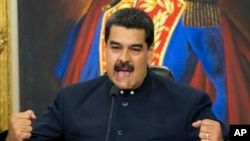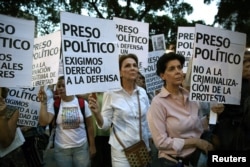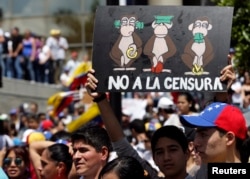Venezuela's passage of a new law threatening up to 20 years in prison for "inciting hatred" is generating concerns about a growing crackdown on dissent.
The powerful, pro-government Constituent Assembly approved the measure Wednesday.
Assembly leader Delcy Rodriguez said it represented "a constructive law for peaceful coexistence" and an antidote to "the intolerances, the hatreds that the Venezuelan right has unleashed."
President Nicolas Maduro had proposed the measure during anti-government street protests that rocked the capital, and other Venezuelan cities, from April through July. More than 120 people died in the almost-daily clashes sparked by the country's deepening economic and political crisis. Activists often used social media to organize demonstrations.
The new law, which carries punishments of 10 to 20 years in prison, requires immediate actions, including administrators of social media accounts to remove any hateful posts and the creation of a commission to enforce the anti-hate legislation, according to the Associated Press.
The law prohibits using television, radio and social media to spread violence and hatred. It also requires public and private media to promote messages of peace for at least 30 minutes a week.
Critics of Maduro's socialist government denounced the law as censorship, and part of a steady erosion of democratic norms.
The United States has amped up pressure to restore those rights, with the U.S. Treasury announcing Thursday that it was sanctioning 10 current or former Venezuelan government officials for "undermining electoral processes, media censorship or corruption in government-administered food programs in Venezuela."
WATCH: Venezuela's New Anti-hate Law Derided as Censorship
'Promotes hatred'
Julio Borges, head of Venezuela's opposition-led National Assembly, said the new law "doesn't stop hatred. That law promotes hatred, division and destruction of the country's freedom."
His legislative body has largely been sidelined by the Constituent Assembly, seated in August but not recognized as legitimate by the United States and many other countries.
The measure is "pretty alarming for journalists and social media users across the country," said Natalie Southwick, Americas researcher for the Committee to Protect Journalists (CPJ). She added that the law is the "latest step in this ongoing effort by the Venezuelan government to monitor and to limit what's being said and shared on social media."
Venezuela's socialist government began clamping down on independent news media after Hugo Chavez came to power in 1992, according to the U.S.-based website Nieman Reports, and Maduro continued the practice when he became president in 2014.
Crimping spread of information
Luis Botello, an official with the Washington-based International Center for Journalists, said the new law would deprive the country's 30 million people of information.
"Journalists do not create or invent facts. … They are the voice of the people who have no voice," and their reports inform "politicians so that they can improve" public policies, Botello said. The law imposes censorship and cheats Venezuelans, he added, "since they will not have the correct information" to hold politicians accountable.
CPJ's Southwick, whose organization earlier this year reported on censorship of social media, expressed worry that incursions against free speech could spread beyond Venezuela.
"Historically, Latin America has been one of the few regions where we haven't seen prior restraint on speech. This could be setting a concerning precedent for other countries — especially key countries going into general elections next year," she said, citing Brazil and Colombia.
Human Rights Watch's Jose Miguel Vivanco derided the new law, tweeting in Spanish: "Nobody should be surprised that autocratic Maduro circus has come so far. The mafia that governs Venezuela has shown many times that it is ready to crush any criticism."
VOA's Carol Guensburg and Irene Serrano also contributed to this report.















